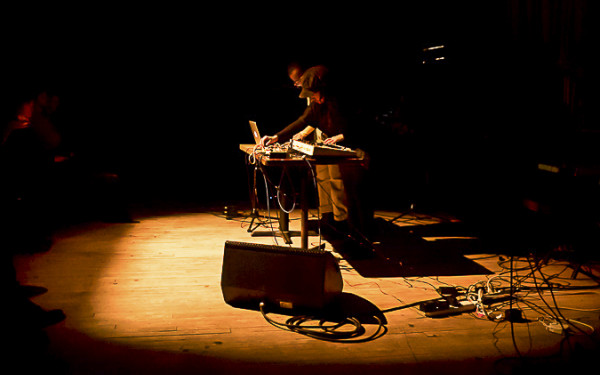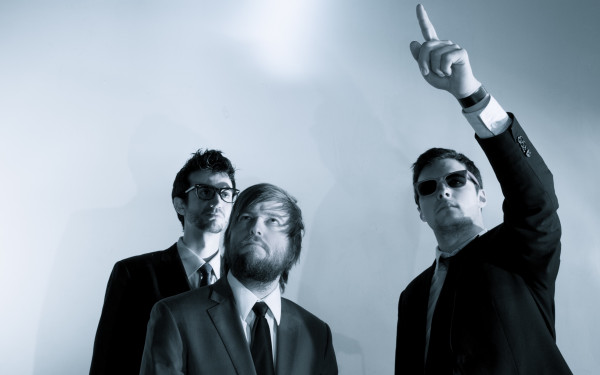Forget Time, Just Dance
An Independent Music Festival in Montreal’s Old Port
The bass is consuming; walking into Ancient Future, you can’t help but dance as you move from stage to stage.
Ribbons decorate nearly every surface; lights in hues of blue, red and green are scattered across the ground and bouncing from tree to tree. If you didn’t know any better, you’d think you were in a real forest.
The relatively small, down to earth festival is still in its infancy—the first one was in May last year.
Compared to more established events such as Osheaga, Mutek or Picnik Electronik, the grounds often felt under-populated, but the scarcity was a welcome change for those hoping to escape the shoulder-to-shoulder feeling of commercial festivals.
With an attendance of about 3,000 over the entire weekend of Sept. 9 to 11, the Quai d’Horloge in Montreal’s Old Port provided an intimate venue to dance and let go.
“The biggest challenge is getting people to come,” explained public relations manager Francis Corbeil-Savage. “It’s really hard for a new festival, especially in Montreal where there is already so much competition.”
The grounds felt free of the pretension and buzz that one may find in the dusty, man-made creature that is Parc Jean-Drapeau. Ancient Future embodied a natural ambiance of peaceful, happy celebration. Cooling off in the hammocks or grabbing a drink came without a sense of urgency.
The scene at Ancient Future wasn’t easy to create, with 25 people working on the park since April, from UQAM students to famous Montreal video jockeys.
“I think we offer a certain quality in terms of installations and experience—there’s hammocks for everyone, des chilling spots—there’s activities. When you go to Osheaga you’re going to be in a foule of thousands of people,” said Corbeil-Savage.
Although Ancient Future focused on bringing underground and local talent to its stages, Florida producer and electronic artist Marcel Everett, known as XXYYXX acted as an unofficial headliner for the festival.
“I think we offer a certain quality in terms of installations and experience—there’s hammocks for everyone, des chilling spots—there’s activities. When you go to Osheaga you’re going to be in a foule of thousands of people.“— Francis Corbeil-Savage
Everett’s roots are in hardcore, but since his 2012 breakout track “About You” went viral, he began producing for a growing list of artists with his signature deep, heady brew of down tempo vocal sampling and hip-hop.
Not that Everett is focused exclusively on producing for others—he asserted that another album is on its way. On producing, he said, “I just wanna make good music, no matter what it sounds like.”
That attitude, as well as Everett’s sound, fit perfectly into Ancient Future’s atmosphere, with the crowd getting especially live for “About You”—a track whose popularity he used to resent. “I had a stage when I hated it—I couldn’t play it,” he explained.
It isn’t hard to see why the song had such success, with it being as unique as it is. Everett’s drive to create off-trend beats was sparked by his disdain for sameness in music. “If you follow trends, you’re going to disappear,” he added.
This approach towards the production scene meshes with Ancient Future’s vision for their lineup, but hasn’t been without its downsides.
Starting an independent music festival is no easy feat, explained Martin Loutrel, president of La Bacchanale—the event-planning group behind the festival.
“We lost a bit of money—about $100,000—last year,” he started. “I mean, to create a festival is something completely different than an event. Even if Bacchanale is doing big nights with 1,000 people, a festival of three days and with three stages is so different.”
Last year’s lineup featured an array of well respected but equally underground artists—such as Octave One or Extrawelt—but their niche scene wasn’t enough to bring a large crowd. “Montreal is a lot more diverse in terms of music, we discovered. We weren’t able to bring three or four thousand people on only underground artists.”
With this in mind, organizers invited a wider range of genres to the festival, in hopes to attract listeners of different parts of the musical spectrum. Now that there’s a better balance of artists, the festival has become profitable, said Loutrel.
The varied musical styles of RYAN Playground, Tokimonsta and Thomas White brought together a mix of people who would get to interact with new genres of electronic music that they usually wouldn’t be exposed to at a single show.
“You still need different music to bring people inside,” quipped Loutrel.
“It’s a unique occasion to mix these crowds,” added Corbeil-Savage. “I think we create something here with all these people that don’t normally hang out together—two different vibes—but now for this occasion they are reunited on a new level.”



1_600_375_90_s_c1.jpg)
1_600_375_90_s_c1.jpg)

